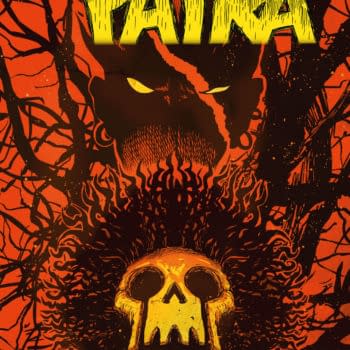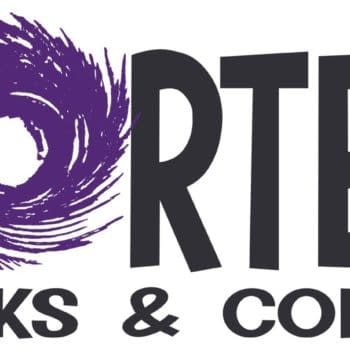Posted in: Recent Updates | Tagged:
Pond Life by Martin Conaghan #3 – Put It On The Page

However, this week, I want to talk about content; specifically, the written word. This one is a bit longer than normal, but hey – it's about writing.
About 15 years ago, I spent most of my free time sending pitches to 2000AD and Judge Dredd the Megazine, usually brief ideas for Future Shocks, Time Twisters, Judge Dredd stories and a variety of sci-fi series. With the exception of one Tharg's Terror Tale, all were roundly rejected and I moved on to other comics publishers, where I enjoyed significantly more success. It wasn't until I stepped sideways into mainstream journalism that I realised one of the key reasons I was constantly receiving Dear John letters from the likes of Alan McKenzie, David Bishop and John Tomlinson, was because my proposals lacked style. I was naive. I thought I could write, but I really only knew how to type. The enthusiasm was there – along with some nice ideas, but I couldn't spell or compose for shit, and it showed.
By style, I don't mean grooviness, or the ability to write crime or sci-fi or action or adventure; I mean The Elements of Style.
If you're a writer, this is the first thing you need to be armed with before you start putting pen to paper. Get this part right and the rest should follow.
Looking back over some of my early pitches, I feel like building a time machine, going back and giving my past self a boot in the arse. They're full of typos, spelling mistakes, grammatical errors and other howlers. Essentially, they lacked 'style'.
It wasn't until I started writing news for the BBC that I discovered the House Style Guide – an elusive document that explains the correct usage of common language in a given journalistic field to convey concise meaning and provide context.
For example, I wasn't aware that the word 'president' should only be given a capital 'p' if it refers to the President of the United States (or any other country).
The same goes for basic usage of commonly misappropriated words; their/there, it's/its, whose/who is, and so on. There is nothing worse than reading a pitch or a script with an apostrophe omitted in the opening sentence. Plurals, adverbs, the correct use of quotation marks. He said, she said. And so on.
It may sound like snobbery, but mastery of English fundamentals gives an editor the clearest indication of your overall ability to utilise spelling, punctuation, grammar, lexical categories, composition and form.
If you can't differentiate between where/were, you're going to struggle to convince someone that you can write fiction with any degree of authenticity. Your words are you. If you make the odd spelling mistake, it can be forgiven. If you misuse a word like 'their', you look like an amateur.
Firstly, if you want to be a writer, you need to follow the age-old cliché: a writer writes. It doesn't matter what you write, but you need to write something – and often. All writing will improve your writing – whether it's done in a professional capacity, or you simply do it for fun. Keeping a blog is a good idea, as it'll let you stretch your vocabulary and let you find your voice.
Secondly, you need to read. Combine your regular reading with consumption of quality material and try to enjoy it. A good newspaper or news website is a good place to start, and you can never go wrong with Pulitzer-winning fiction. All reading will benefit your writing. Of course, comics should be part of that list too – old ones, and new ones.
Watch good television and movies. Listen to what the characters are saying. Watch how the story unfolds. It's all in there – you just need to look for it.
But there are also practical guides to developing style. I started with JB Strunk's 'Elements of Style'. It's a bit on the drab side, but if you're serious, you'll read it and memorise the advice. If you can't be bothered working through it, maybe writing isn't for you.
There's also The Times Style Guide, The Guardian Style Guide, and The Oxford Style Guide.
But writing isn't just about style, it's about passion – and it should be a part of your life. Don't just pursue comics as a means to an end. Submit articles to magazines, newspapers, websites, short story anthologies, poetry magazines and any other written word publication. Write letters to the editor (some magazines pay out for star letters, and you'll see your work in print if it's any good). Write about topics that interest you or subjects that seem easy to write about. All writing will improve your writing. Not writing will make you stagnant. Get motivated and write. It's that simple.
Seek feedback. You will learn nothing if people are not in a position to review your work and tell you what they think of it. Friends and family are a good place to start, but they tend to be soft on your foibles and can be reluctant to hit you with harsh truths. Other professionals may not have the time, but they will at least give you an honest opinion, if they can. The best way to get feedback on your work is to submit it to official publications and wait for a response. If you don't get a response, give them a gentle reminder a few weeks (or months) down the line. The feedback will inevitably be negative, but you will learn from it if you are willing to. Don't contest it, just weed out the errors.
Structure your work: all writing is about telling a story. It should have a beginning, middle and an end. Apply this axiom to everything from your cover letter, to the pitch, the plot and the script itself. Properly-structured writing is easy to read and understand. A casual, conversational tone is no replacement for well-crafted detail.
Set aside time to write. Some people can write in the busy and noisy atmosphere of a newsroom, some people need peace and quiet. Some people can only write one single word at a time, others need to write thousands in one sitting in order to satisfy themselves that they've achieved something for the day. You will only find out when you sit down and establish a routine. Some people write in their head and batter it all down in one go. Some daydream on the train and take notes, then bash it all out. Some people write longhand, and then type it all out.
Lastly, realise that you are shit – you just don't know it yet. Everyone believes they can write until they realise they can't, and then they do something about it. If you don't do something about it, you will never improve.
When you've mastered the basics, the only other little gem of advice I've ever been given in my writing career so far is this:
"Omit needless words".
Think about it.
——————————————————————————————
Martin Conaghan is a journalist and broadcaster at the BBC and a freelance comic book writer. The views expressed here are his own. He is also the editor of Insomnia Publications' Vigil line of historical graphic novels and the writer of Burke & Hare.
Are you a small press publisher, writer or artist? Do you have something you think might be worthy of mention on Pond Life? If so, tell Martin about it at pondlife@copydesk.co.uk
You can request to follow Martin at Facebook or Twitter.











